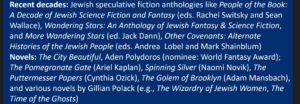Why do I have trouble announcing cool things? Why is it so very difficult to tell you all that I’m on two short lists?
The first list is for an Australian award for my book Story Matrices (edited by Francesca Barbini), and the second is an international one for the Sidewise Award (alt history) for my Medieval story in the amazing Other Covenants short story collection. The short story is “Why the Bridgemasters of York Don’t Pay Taxes,” edited by Andrea D. Lobel and Mark Shainblum (who I finally met, just the other day). Both lists are wonderful to be on. I’m unlikely to win either.
While both are most excellent, the Sidewise in particular is a wonderful moment. Even I can’t deny that.
There is a special, special honour in being listed along with these amazing writers. It’s taken me days to admit this. Partly this is because I’ve not had much comment either short listing. Six people have told me how pleased they are about the William Atheling one, and one of those six is my mother. Another is the editor. This means I feel a bit invisible. Partly this is because there are far better writers than me and it’s easier to talk about them than to talk about my own work. Also, partly this is because Australia is a bit odd. Some people get big shouts for all their accomplishments… I am not one of those people. One day I will discover why, but until that day comes, I will assume my writing is just not that good. There is a lot of encouragement for me to think that and very little for me to think otherwise. Except from German academics, but that’s another story.
However… there are things that no-one’s asked me about my short story and this is the moment to spill the beans. In order for me to spill the beans you need to know about my short story and about one of my novels. Bridgemasters was only released in December last year. The novel is The Green Children Help Out, which came out in 2021. The reason I thought my Bridgemasters story would go unnoticed was because the Green Children went pretty much unseen. There was, however, a much bigger reason for it going unseen than my self-doubt. COVID lockdowns and quiet hit me harder than some, because I was unable to go to any events face to face (I’m COVID-vulnerable), and in Australia it’s almost impossible to reach readers unless they see and talk to you, I’ve found. The story and the novel are linked. In fact, I wrote the Bridgemasters story (and a couple of others) as a testing ground for the world I was building for the Bridgemasters story. They’re quite different, but they’re set in the same alternate Earth. I wanted to know what sort of cultural underpinnings my English Jewish characters would have in this alternate Earth. I test these things in a number of ways, and I build the world gently and carefully, then I let it rip with a story or two. The other stories are in the volume of my collected short stories (Mountains of the Mind), which was also short listed for an award. I am obviously not good at learning.
I thought my Green Children novel was good, but I didn’t think my Bridgemasters story was anything more than a small fun piece, translating late Medieval Christian thought into a world inhabited by Jews that a very particular group of Christians are forced to protect. This just shows that some writers are not good judges of their own work. It also shows that being mainly confined to a tiny physical world for three years was not the end of the known universe. I’m working on a gentle and slow emergence. We’ll see if that changes anything.
I should just have said, “Look! Announcements!” If I win either (unlikely) I promise to do that. In the meantime, I hope a few more readers see my work and make up their own minds about it. Quite obviously I’m not the right person to advise on whether to read my work!
 If you’re in the United States and looking for something to do besides watch the political shenanigans going on right now, check out Alternative Liberties from B Cubed Press. Both the Kindle edition and the print version are now available.
If you’re in the United States and looking for something to do besides watch the political shenanigans going on right now, check out Alternative Liberties from B Cubed Press. Both the Kindle edition and the print version are now available.
